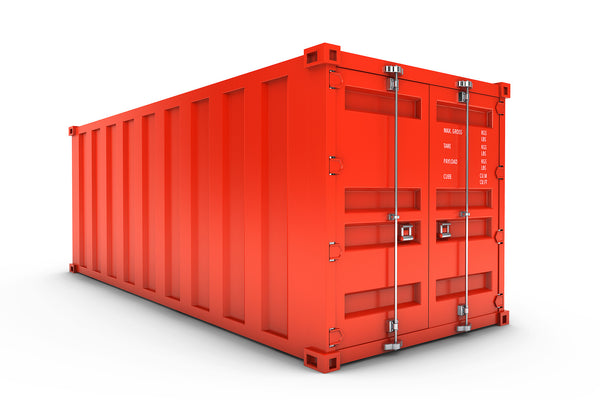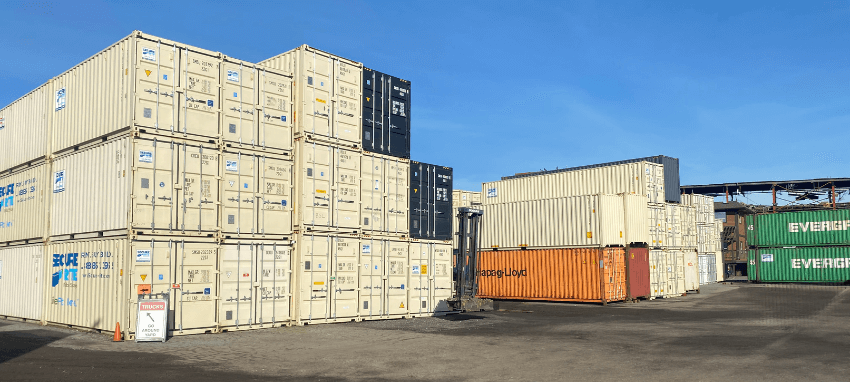Everything You Required to Find Out About Shipping Containers and Their Practical Applications
Shipping containers have actually developed from mere tools for transportation to versatile frameworks with many practical applications. Their robust layout and conventional sizing make them suitable for a variety of usages beyond shipping. From ingenious real estate solutions to lasting farming, their versatility is notable. Yet, the possibilities do not finish there. Discovering their various features exposes surprising understandings right into modern difficulties and imaginative solutions. What various other functions could these containers play in today's globe?
The Design and Structure of Shipping Containers

Inside, containers are made to maximize area, often featuring wooden or steel flooring that can sustain significant weight. Air flow systems may be included to avoid moisture accumulation, which is critical for delicate freight. In addition, strengthened corners permit simple handling by cranes and forklifts, promoting seamless loading and unloading. This thoughtful design and structure add to the containers' adaptability across various shipping and storage space applications.
Benefits of Making Use Of Shipping Containers
While lots of transport techniques have their benefits, the use of delivery containers sticks out because of their unmatched adaptability and efficiency. Shipping containers offer a standard dimension, making them very easy to stack and transport across different settings of transportation, consisting of vehicles, ships, and trains. This standardization reduces loading and discharging times, therefore raising total efficiency.
Shipping containers are built from durable materials, supplying durable protection for products throughout transportation. They are weather-resistant and protected, decreasing the risk of damages from environmental variables or theft. Furthermore, the modular layout of shipping containers enables very easy customization, allowing companies to adapt them for numerous purposes, such as storage space or mobile offices.
Finally, their mobility and cost-effectiveness make shipping containers an attractive choice for companies looking to improve logistics and supply chain procedures. These advantages contribute to the growing popularity of delivery containers in different sectors.
Innovative Housing Solutions With Shipping Containers
Ingenious real estate services have emerged as an amazing application of delivery containers, leveraging their intrinsic toughness for domestic use. These flexible structures offer a lasting option to traditional structure products, typically at a portion of the expense. Developers and architects have actually transformed containers into elegant, practical homes, accommodating varied lifestyles and choices.

Shipping containers are eco friendly, promoting recycling and minimizing waste. Lots of tasks concentrate on power effectiveness, incorporating green roofings and solar panels. As urbanization boosts, these cutting-edge real estate options present a functional response to real estate lacks while promoting an unique building visual.
Shipping Containers in Retail and Pop-Up Shops
An expanding number of stores are turning to delivering containers as a vibrant option for pop-up shops and retail areas. These flexible frameworks provide a cost-efficient option to standard stores, permitting businesses to produce special, captivating settings that draw in clients. Their modular layout allows easy transport and installment, making them perfect for seasonal or short-term he said retail locations.
Retailers can customize shipping containers to reflect their brand identity, transforming them right into visually appealing stores that stand out in jampacked marketplaces. The compact nature of containers likewise urges efficient use space, enabling imaginative designs that optimize consumer circulation and engagement. Additionally, delivering containers can be situated in unconventional locations, such as urban parks or uninhabited whole lots, enhancing accessibility and foot web traffic.
As the retail landscape evolves, shipping containers provide a innovative and flexible solution that meets the needs of contemporary consumers while boosting the shopping experience.
Lasting Farming Practices Utilizing Shipping Containers
Sustainable farming methods increasingly integrate delivery containers as cutting-edge options for agriculture - sea can for sale. These container farms make use of hydroponics to make the most of room and source efficiency, providing an economical method to food production. By changing shipping containers into agricultural centers, farmers can deal with food security and ecological problems simultaneously
Container Farming Perks
While standard agriculture encounters challenges such as land shortage and climate adjustment, container farming provides a viable option that takes full advantage of area and sources. This ingenious approach permits year-round plant manufacturing in regulated environments, reducing dependence on climate condition. Container farms utilize much less water than standard farming, advertising sustainability and preservation. They can be established in metropolitan areas, bringing fresh produce closer to customers and decreasing transportation exhausts. Additionally, the modular nature of delivery containers enables scalability, allowing farmers to adjust procedures based on demand. Container farming additionally lessens pesticide usage by developing an enclosed ecological community, ultimately enhancing food safety and security. As city populaces expand, container farming becomes a useful solution to fulfill the raising need for regional, sustainable food resources.
Hydroponics in Containers
Hydroponics, which enables plants to expand without soil by utilizing nutrient-rich water, grows within the boundaries of shipping containers, making it an optimal approach for metropolitan farming. These containers create a controlled atmosphere that maximizes light, moisture, and temperature level, enabling year-round cultivation. With limited area in urban areas, shipping containers use a scalable solution for growing fresh produce. Hydroponic systems within containers can include various methods, such as nutrient movie technique (NFT) and deep water society (DWC), which take full advantage of return while reducing water use. This cutting-edge strategy not only improves food safety yet additionally lowers the carbon footprint associated with conventional farming methods. Hydroponics in containers represents a forward-thinking solution for lasting metropolitan food manufacturing.
Economical Farming Solutions
As food production deals with enhancing challenges because of environment change and urbanization, shipping containers become a More Bonuses cost-effective solution for agriculture. These functional frameworks can be repurposed for different sustainable farming techniques, such as hydroponics and upright farming. By utilizing controlled atmospheres within containers, farmers can maximize growth cycles and decrease source consumption, including water and plant foods. In addition, delivering containers can be tactically positioned in metropolitan areas, minimizing transport expenses and improving accessibility to fresh fruit and vegetables. Their modular nature enables for scalability, making it possible for farmers to expand procedures as need expands. Repurposing containers contributes to waste reduction, straightening with eco-friendly farming campaigns. In general, delivering containers present innovative opportunities for sustainable and effective food production.
Emergency and Disaster Alleviation Applications of Shipping Containers

Organizations regularly utilize shipping containers to develop mobile facilities or field health centers, making certain that healthcare gets to those in requirement. Additionally, they can be changed into command facilities for coordinating rescue operations, thus enhancing business efficiency during situations.
Containers can be modified to keep essential goods such as water, food, and apparel, securing materials till they are dispersed. Their flexibility permits them to be conveniently transferred to various locations, guaranteeing that help arrives where it is most quickly needed. Generally, shipping containers play a crucial function in enhancing the efficiency of catastrophe alleviation initiatives worldwide.
Frequently Asked Questions
Just How Are Shipping Containers Transported From One Location to Another?
Shipping containers are moved using trucks, trains, and ships, utilizing cranes for filling and discharging. This multi-modal transportation system makes sure efficient movement throughout land and sea, attaching global supply chains and helping with worldwide trade.
What Is the Average Life-span of a Delivery Container?
The ordinary life-span of a shipping container typically ranges from 10 to 25 years, depending on upkeep, use, and environmental factors. Correct care can extend their usability, while overlook might lead to degeneration and damages.
Can Shipping Containers Be Modified for Various Usages?
Yes, delivering containers can be changed for numerous usages. They act as homes, workplaces, pop-up shops, and storage space devices. Their adaptability enables imaginative adjustments, making them appropriate for a wide variety of applications.
Are Shipping Containers Eco-friendly?
Shipping containers can be eco-friendly, as they advertise recycling and repurposing. Their resilience decreases waste, while their usage in alternate housing and services decreases the need for brand-new products, adding to sustainable methods.
How Do I Pick the Right Size Shipping Container?
To choose the appropriate size shipping container, one need to analyze storage space needs, think about the desired usage, and examine room availability - shipping container storage. Usual my website dimensions consist of 20-foot and 40-foot containers, each serving various storage and transport requirements efficiently
Innovative housing remedies have emerged as an exciting application of shipping containers, leveraging their fundamental strengths for domestic use. The versatility of shipping containers allows for creative layouts, from single-unit houses to intricate multi-container plans. Lasting farming methods increasingly incorporate delivery containers as cutting-edge options for farming. In addition, the modular nature of delivery containers makes it possible for scalability, enabling farmers to change procedures based on demand. Hydroponics, which permits plants to expand without soil by using nutrient-rich water, prospers within the boundaries of shipping containers, making it an optimal method for city farming.